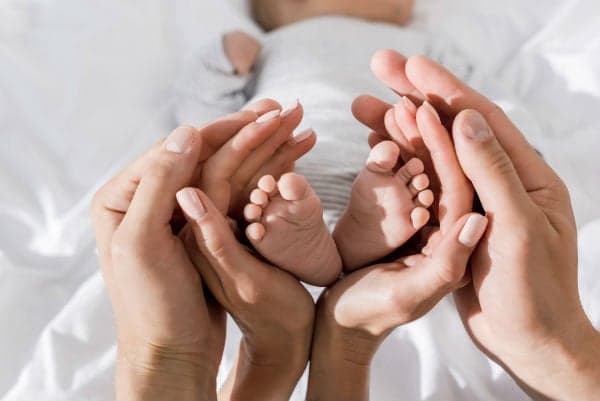Spanish fertility doctors behind world's first 'three-person' baby

A team of Greek and Spanish doctors announced Thursday the birth of a baby using DNA from three people after a controversial fertility treatment that has provoked intense ethical debate
The team used an egg from the infertile mother, the father's sperm and another woman's egg to conceive the baby boy, transferring genetic material with chromosomes from the mother to the egg of a donor whose own genetic material had been removed in a process its creators hailed as a medical "revolution".
A similar DNA-switching technique was used in Mexico in 2016 to avoid transmission of a mother's hereditary illness to her child.
But the case in Greece is the first time an IVF (in vitro fertilisation) technique using DNA from three people has been deployed to allow a mother otherwise unable to conceive to have a child.
The baby, born Thursday and weighing in at 2.96 kilos (6.5 pounds), was delivered by a 32-year-old Greek woman who had undergone several unsuccessful attempts at in vitro fertilisation, Greece's Institute of Life said in a statement.
Institute of Life president Dr Panagiotis Psathas, stated: "Today, for the first time in the world, a woman's inalienable right to become a mother with her own genetic material became a reality.
"As Greek scientists, we are very proud to announce an international innovation in assisted reproduction, and we are now in a position to make it possible for women with multiple IVF failures or rare mitochondrial genetic diseases to have a healthy child."
Dr Psathas added: "Our commitment is to continue to help even more couples facing fertility issues to have children with their own DNA, without having recourse to egg donors."
'Will help countless women'
His scientific collaborator of the Institute of Life, Dr Nuno Costa-Borges, also hailed the news.
"The completely successful and safe implementation of the Maternal Spindle Transfer method -- for the first time in medical history -- is a revolution in assisted reproduction," Dr Costa-Borges said.
He added that "this exceptional result will help countless women to realise their dream of becoming mothers with their own genetic material."
In the Mexican case, the mother had been suffering from Leigh syndrome, a rare illness which affects the developing nervous system and can be fatal. In her case, the disorder had previously caused the deaths of two of her children.
Using the triple DNA technique to aid in infertility cases raises complex ethical issues, however.
Tim Child, Oxford University professor and medical director of the Fertility Partnership, expressed his concern.
"I'm concerned that there's no proven need for the patient to have her genetic material removed from her eggs and transferred into the eggs of a donor.
"The risks of the technique aren't entirely known, though may be considered acceptable if being used to treat mitochondrial disease, but not in this situation," said Child.
By AFP's Chantal Valery
Comments
See Also
The team used an egg from the infertile mother, the father's sperm and another woman's egg to conceive the baby boy, transferring genetic material with chromosomes from the mother to the egg of a donor whose own genetic material had been removed in a process its creators hailed as a medical "revolution".
A similar DNA-switching technique was used in Mexico in 2016 to avoid transmission of a mother's hereditary illness to her child.
But the case in Greece is the first time an IVF (in vitro fertilisation) technique using DNA from three people has been deployed to allow a mother otherwise unable to conceive to have a child.
The baby, born Thursday and weighing in at 2.96 kilos (6.5 pounds), was delivered by a 32-year-old Greek woman who had undergone several unsuccessful attempts at in vitro fertilisation, Greece's Institute of Life said in a statement.
Institute of Life president Dr Panagiotis Psathas, stated: "Today, for the first time in the world, a woman's inalienable right to become a mother with her own genetic material became a reality.
"As Greek scientists, we are very proud to announce an international innovation in assisted reproduction, and we are now in a position to make it possible for women with multiple IVF failures or rare mitochondrial genetic diseases to have a healthy child."
Dr Psathas added: "Our commitment is to continue to help even more couples facing fertility issues to have children with their own DNA, without having recourse to egg donors."
'Will help countless women'
His scientific collaborator of the Institute of Life, Dr Nuno Costa-Borges, also hailed the news.
"The completely successful and safe implementation of the Maternal Spindle Transfer method -- for the first time in medical history -- is a revolution in assisted reproduction," Dr Costa-Borges said.
He added that "this exceptional result will help countless women to realise their dream of becoming mothers with their own genetic material."
In the Mexican case, the mother had been suffering from Leigh syndrome, a rare illness which affects the developing nervous system and can be fatal. In her case, the disorder had previously caused the deaths of two of her children.
Using the triple DNA technique to aid in infertility cases raises complex ethical issues, however.
Tim Child, Oxford University professor and medical director of the Fertility Partnership, expressed his concern.
"I'm concerned that there's no proven need for the patient to have her genetic material removed from her eggs and transferred into the eggs of a donor.
"The risks of the technique aren't entirely known, though may be considered acceptable if being used to treat mitochondrial disease, but not in this situation," said Child.
By AFP's Chantal Valery
Join the conversation in our comments section below. Share your own views and experience and if you have a question or suggestion for our journalists then email us at [email protected].
Please keep comments civil, constructive and on topic – and make sure to read our terms of use before getting involved.
Please log in here to leave a comment.